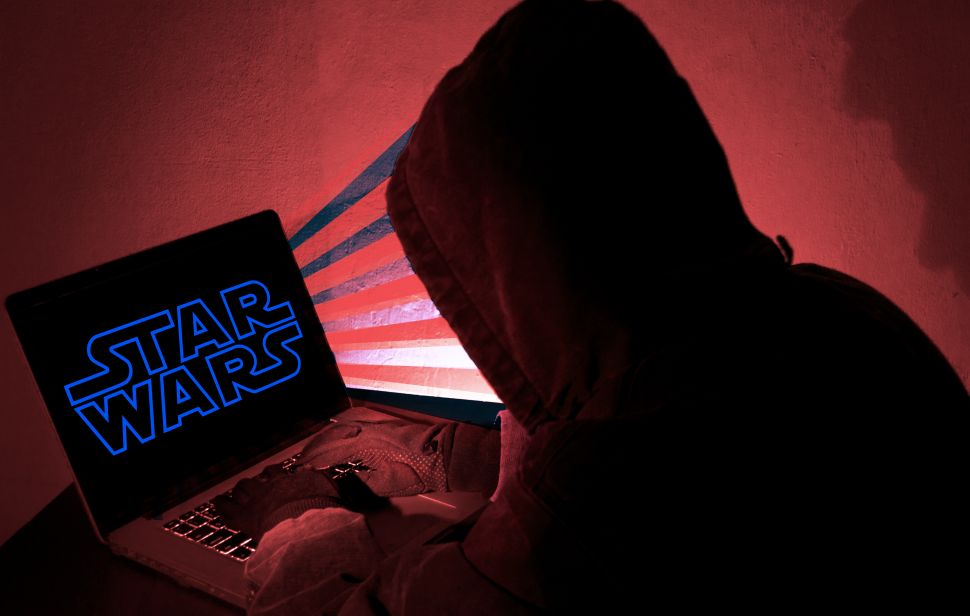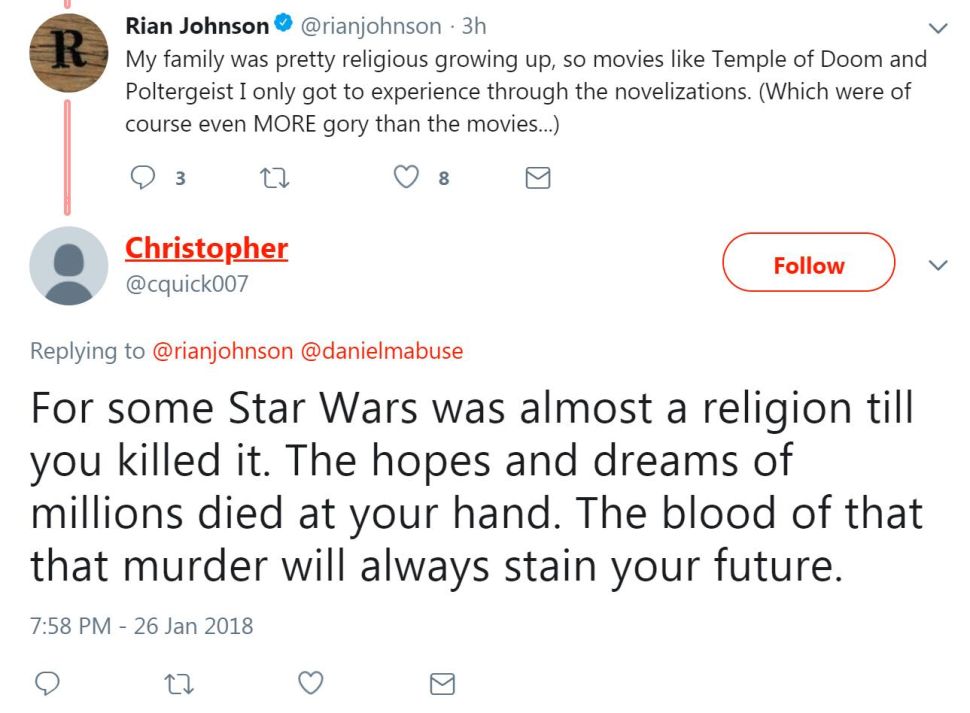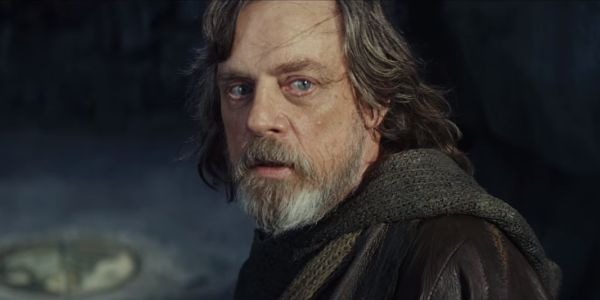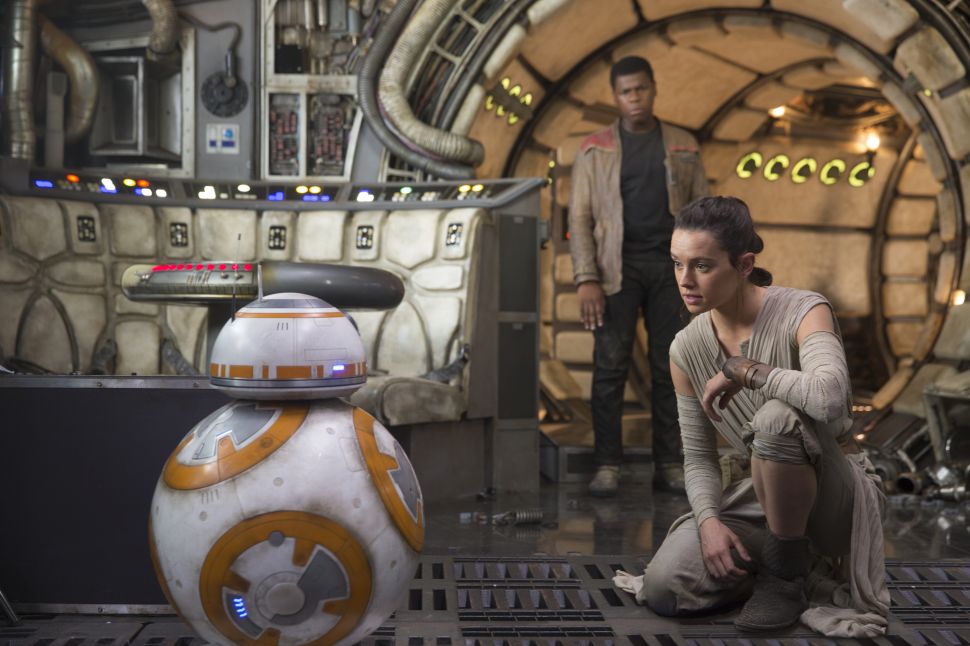
For entertainment reporters, sharing opinions is a job. But when you do that with Star Wars films, someone may call you the c-word.
Following the release of The Last Jedi in 2017, Vanity Fair‘s Joanna Robinson wrote a review.
“One thing … that got a lot of negative feedback was my exploration of mansplaining,” Robinson told me. “What Laura Dern and Carrie Fisher’s characters had to deal with.”
You know, normal entertainment reporter stuff.
“And I got called cunt, bitch and told to kill myself because of that… It sounds cynical, but I’m kind of used to it at this point. But if you do take a step back, it’s crazy that Star Wars fans have told me to kill myself. Repeatedly.”
Something is deeply broken among the Star Wars faithful. Respectable discourse has deteriorated completely as a small but determined minority of “fans” turn to the Dark Side—hate-spewing assholes looking to ruin the party for everyone, and often succeeding.
Disney and Lucasfilm’s Solo: A Star Wars Story hits theaters in 10 days, which means the movie’s creators, actors and normal fans who just like a good lightsaber battle should quickly find a Hoth-like hideout to survive the inevitable online backlash and warmongering fallout.
The “Fans” Prove Everyone’s Terrible
Following the release of The Last Jedi, writer/director Rian Johnson’s Twitter feed was bombarded with deranged messages from disgruntled fans who hated his film with such a fiery passion that even Palpatine would recoil in fear and disgust. In addition to the masses of angry everyday fans, even such illustrious figures as Stormy Daniels took aim at the filmmaker.
Steaming pile of shit>Last Jedi Go ahead and unfollow me. In case no one has noticed, I don't give a fuck. Its the worst movie ever made and Rian Johnson can drop dead.
— Stormy Daniels (@StormyDaniels) January 4, 2018
Did you enjoy joining Kathleen Kennedy in raping Luke Skywalker and Carrie Fisher's dead body?
— Fabian Fischer (@fabianf44120064) December 30, 2017

Online petitions quickly sprang up calling for Disney to re-make the movie entirely, while quickly developing Facebook groups included How Rian Johnson Ruined Christmas (a Star Wars Story), Disney Killed Star Wars on December 14th 2017 and Fuck Rian Johnson & Kathleen Kennedy.
Johnson received numerous death threats… over a kids movie… about space samurai.
Visible Star Wars fans who have argued for the virtues of the film have been met with swift retaliation.
“I’ve had some Star Wars fans get a hold of my email address and sign me up for forums with abusive and threatening usernames,” Bryan Young, a writer, filmmaker, and journalist who contributes to StarWars.com, told Observer. “…I’ve had messages directed at me over the ‘stupidity’ of naming my son Anakin.”
Vanity Fair‘s Robinson added: “I comfort myself with the thought that it has to be a minority. It’s can’t be what the majority of the country and the whole world thinks.”
Star Wars fandom has always been passionate, but rarely has it told someone to commit suicide or hurled the expletive “libtard” as a common retort.
It didn’t use to be like that.
Maybe Not Everyone’s Terrible… Maybe?!?
It’s easy to forget that when oft-derided The Phantom Menace opened back in 1999, there were a smattering of positive reactions. Filmmaker and uber-fan Kevin Smith wrote over at his View Askew site: “Of the film, I can say many things. But the long and short of it is that I liked it—quite a bit. I’d rank it right after Empire in a list of fave Star Wars flicks. It starts great, ends great, and has great stuff sprinkled in between.”
Roger Ebert found the movie downright delightful, writing: “Star Wars: Episode I–The Phantom Menace, to cite its full title, is an astonishing achievement in imaginative filmmaking.”
Of course there were plenty of negative reviews and fan backlash, but the common narrative that “George Lucas ruined my childhood” didn’t take on its full form until a few years later. Consumers simply weren’t able to bully critics (and one another) with the digital ease and convenience and to the extent of what is possible today.
When J.J. Abrams and Lucasfilm released the first teaser for The Force Awakens in 2014, roughly one year ahead of its premiere, it was dissected, analyzed and judged to a greater degree than any other Star Wars product ever before (the trailer generated a then-record of 112 million views online within its first 24 hours).
Immediately, fans began taking sides, with many excited at the prospect of Episode VII, but plenty more dismayed (one eye-opening tweet I remember seeing at the time criticized the trailer for having “Tracy Morgan” pop up out of nowhere).
What? Just found out the #StarWars trailer was not a spoof! What is Tracy Morgan doing there? Only in a Galaxy far far away…
— Caspero moon (@1lenchdog) December 3, 2014
It was a far more widely divisive ecosystem with even more negativity than the prequel era. Those trailers didn’t generate nearly the same level of aggressive skepticism, and this trend has continued through the sequel trilogy.
Some moviegoers who didn’t care for The Force Awakens stubbornly dug their heels, forming online “fan” groups aimed at boycotting future Star Wars films, calling for their removal from canon and systematically driving down audience scores on aggregate review sites.
The same group that took credit for The Last Jedi‘s Rotten Tomatoes tumble formed a since-removed alt-right Facebook group and tried to take down Marvel’s Black Panther back in February.
In response to the concerning rise in toxicity and hostility, the hashtags #SWRepMatters and #SWisagirlthingtoo have been cultivated by online communities to try to combat these “fans.” These groups promote mental health awareness, diversity inclusion and a sense of positive thinking among the Star Wars faithful.
But as we know, it takes more than well wishes to slay a Sith Lord.
Every single Star Wars movie is inherently goofy and good-natured in its own way—meant to be digestible, enjoyable and soaring all at once—specifically because they are fantastical yet relatable adventures designed to appeal to both a 12-year-old and a 40-year-old. They are excellent products of function.
However, the film community often treats the series as holy scripture, which is where both the good and bad are born.
The Disintegration of Star Wars Fandom
“I honestly think that Star Wars is the most hotly debated for two reasons. One, it’s the most popular. And two, it’s part of our contemporary mythology,” Young explained. “Star Wars is religion. Even for those who have their own theologies, Star Wars reinforces it. For many people, these are serious and sacred texts that have helped them through as many problems in their life as the Quran or the Bible. I think if you look at recognizability of characters, Batman and Superman, indeed most popular comic book characters, have that same sort of lesson-teaching ingrained in many generations that makes it seem more personal to them.”
Passion has helped sustain Lucas’ creation for more than 40 years and generated billions upon billions of dollars. Passion is why the fan community 501st Legion cosplays for charity. But there’s an ugly side to passion as well, one that will likely boil over again in some form with Solo.
“It seems important to understand that fandom is different from other forms of affinity we experience,” cultural anthropologist Susan Kresnicka, founder and president of Kresnicka Research & Insights, told Observer. “When we are fans, the object of fandom (OOF) meets very real, very important human needs—needs surrounding self-care, social-connection and identity.
“When we are fans, the object of fandom comes to represent some facet of who we consider ourselves to be—our moral values, our beliefs, our politics, our priorities, our approach to life, etc.,” she continued. “So when we are defending our OOFs, we are defending ourselves, which helps to explain the passion and vehemence that characterize our reactions.”
By that logic, these “fans” must have felt personally threatened—though who can really understand why—when they directed this hate toward The Last Jedi, writer/director Rian Johnson and Lucasfilm president Kathleen Kennedy.
Rian have you ever thought about what the world would be like if you'd never been born? I sure have. Those alternate time lines seem better than the ones where Hitler was never born.
— DG (@Grey0187) May 10, 2018
Thanks for destroying my childhood, i would rather have Ed Wood makeing the last jedi. You and Kathleen Kennedy ruined Star Wars, good job. pic.twitter.com/zYzQSs8BYD
— Trumpets Call (@TrumpetsCall) May 7, 2018
Why These New Star Wars “Fans” Are the Worst
So what specifically are the most common arguments made by incensed fans these days?
Some of the more level-headed viewers out there have pointed to story and character-specific issues as to why they didn’t enjoy The Last Jedi. These include problems with how Luke’s character was handled, the movie’s inconsistent humor, Leia pulling a Mary Poppins in space, a lack of payoff to mysteries raised in The Force Awakens and other subjective concerns about plot and script elements.
Many dislike all of the Lucasfilm content made under Disney after the Mouse House scrubbed the Expanded Universe (30 years of books, games, etc.) from the official canon. Beholden to the previous parameters of the series, these fans are dead-set on opposing any and all Disney era Star Wars offerings. The harsh reaction to the 180 on Luke’s character in The Last Jedi only drove that point further home.
Ultra right-wing fans have taken extreme umbrage with the sequel trilogy and anthologies’ emphasis on diversity. These viewers can’t seem to accept a black main character (John Boyega’s Finn) or heroic female leads (Daisy Ridley’s Rey and Felicity Jones’ Jyn Erso from Rogue One).
Boyega called these viewers out, right around the release of The Force Awakens, saying they were “victims of a disease in their mind” and that he was a “confident, Nigerian, black, chocolate man.”
Ridley has dismissed all of the “Mary Sue” talk around her character as blatantly sexist.
It is in these complaints that the racist and chauvinistic undertones of the fandom can be seen in all of their provincial ugliness. These viewers are afraid of what they perceive to be the diminishing power of the white male in society.
These are the “fans” who make Star Wars a particularly hostile environment for some to traverse, especially for female entertainment reporters who receive endless streams of nasty hatred online. Except these aren’t fans at all, they’re simply trolls who want to stir up controversy and elicit reactions. They’re nothing more than attention-seekers who are struggling to find arenas for bullying after grade school.

“Fans” vs. Trolls: How Technology Only Encourages Hatred
Whether they would admit it or not, the Hollywood powers that be want to hear from fans to better construct blockbusters that appeal to mass demographics, especially as the movie-making landscape becomes further dominated by familiar IP.
But acting on that feedback can produce drawbacks of its own.
“Long-standing franchises (like Star Wars) often carry modern political baggage by nature of being made in earlier eras when men, white people, straight people, etc. were even more socially privileged, and thus overrepresented in media,” KR&I’s Rachel Aparicio, a media studies scholar, told Observer. “Newer iterations of these franchises have often responded to those critiques by being somewhat more inclusive. However, this leads to the (arguably correct) perception that modern media is responding to a social justice agenda. This has made popular culture a lightning rod for conservatives—particularly conservative, white men—who see this process as symbolic of their (perceived) lessening of social and political power.”
Fuck Rian Johnson! That piece of Shit! I can even put on a New Hope without my 8yr old saying this isn't going to go the way you think! Then laughs at how much Luke Skywalker sucks in the Last Jedi. #RuinJohnson #thelastjedisucks #thelastjediawful #NotMyLuke #notmystarwars
— SithLordLukeSkywalker (@sith_luke) May 6, 2018
That goddamn son of a bitch! Cut his own penis (at least figuratively…) to be accepted as a non-male director by that insane nazi witch KK. What next? Justice for earthworms? Disney accepts only amoebas to work as screenwriters?
— RussianBot-497 (@497Russianbot) May 13, 2018
https://twitter.com/Rhamzees/status/943715440827789320

“These fans are lashing out in a way that is protective of straight white men,” Robinson observed.
While countless fans have cultivated well-founded and articulate criticisms of the new films, it is these rabble-rousers who harp on a franchise’s diversity that seem to dominate the conversation with the loudest voices. At the root of the issue is a difference in opinion that has been taken to its extreme.
“I think the splits occur because people like different things, and they forget that not every piece of Star Wars media can be all things to all people,” Young said. “We all have different tastes, and sometimes people think their taste knows better than the artists who created it. And it absolutely is only louder and more noticeable because of social media. But for anyone willing to talk about Star Wars, from the very beginning, good or bad, the debate has always been passionate.”
Perhaps this isn’t anything new. Perhaps this was just a dormant virus waiting for mass communication technologies to develop so that it could infect and multiply.
Young argues that Star Wars fandom first fractured with the much-reviled Special Editions in 1997 and then again with the divisive prequel trilogy. Had Twitter been around back then, we would have been witnessing the same types of online battles. We now live in the age of entitlement and anonymity, and anyone who has ever perused a comments section can see that it has given free reign to the darker corners of the internet that don’t have to face the consequences of their words.

The internet will always house trolls. Despite their inevitable presence, these figures seem to be most drawn to blockbuster franchises (some fans of the DC superhero movies are known to share a similar temperament), emerging with ultra-aggressive takes and bullying journalists, actors, directors and fans who don’t share their views.
It is in these self-constructed online echo chambers in which these kinds of issues first begin to sprout and inevitably lead to conflict.
Ultimately, despite all of the benefits that the internet and social media provide in disseminating information and improving communications, it may have torn down the healthy manner in which we used to consume and debate cinema.
[protected-iframe id=”bb99f76fc3c5e8b545df9ce4f134cb9e-35584880-133125669″ info=”https://www.facebook.com/plugins/post.php?href=https%3A%2F%2Fwww.facebook.com%2FVirginRadioTatooine%2Fposts%2F1534115843373423&width=500″ width=”500″ height=”271″ frameborder=”0″ style=”border: none; overflow: hidden;” scrolling=”no”]https://www.youtube.com/watch?v=H3EPhMvzGCM
The Real Reason Star Wars “Fans” Have Lost Their Minds
So, why has Star Wars fandom turned to the Dark Side?
Some fans simply cannot handle deviations from the original trilogy. As Young properly noted, there are large segments that consider those films holy texts, “affirmational/curational fans” that Kresnicka says are invested in preserving and sometimes even sacralizing the early stories like a fossil.
In this vein, a strange dichotomy has emerged where The Force Awakens was knocked for being too similar to the original Star Wars and The Last Jedi has been criticized for being too different.
You’re never going to please everyone, but the Star Wars fandom can’t even agree on what they disagree about.
Some fans can’t align themselves with films that seem to counter their inner social and political beliefs, no matter how worthy Boyega and Ridley have proven themselves of being.
The real reason trolls have lost their minds when it comes to Star Wars may be more elemental.
This series has 40-plus years of esteemed history behind it, a track record no other pop culture franchise can match. It’s in our DNA; it is modern American mythology that has supplanted ancient Greek lore, which Observer contributor and cinema analyst Film Crit Hulk described as “morality tales with lessons of hubris and pain and suffering. They’re parables meant to inform us about our own human shortcomings.”
Star Trek has the same multi-generational fan base, but it wasn’t as revolutionary or as quickly embraced as Star Wars. The original show was canceled after three seasons and only became a phenomenon years later. The James Bond series goes back even further than Star Wars, but with its rotating cast of main actors and no semblance of running continuity, it never let audiences get emotionally invested enough to be revered or as closely guarded in the same way as Star Wars.
Maybe when these movies present something that doesn’t align with this minority groupthink, the extreme detractors see it as Disney futzing with history, altering the course of their own lives that were spent growing up in tandem with this franchise. Perhaps it feels like a personal attack on their core memories, like a hostile takeover of their Inside Out mainframe.
It can’t be easy to see a friend of more than four decades head down a path you’re not comfortable with. But if your fandom has calcified to the point where you’re only seeking out the negatives and looking to cut others down over their enjoyment of the series, then you’re not even a fan at all.
You’re just a sad little troll.

